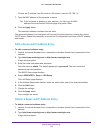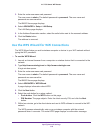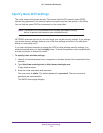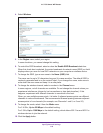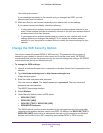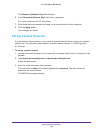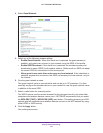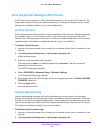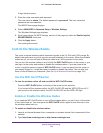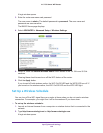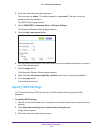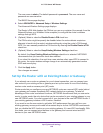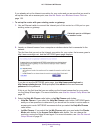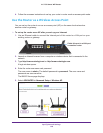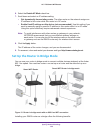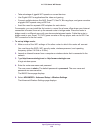
Specify Network Settings
123
AC1750 Smart WiFi Router
A login window opens.
3. Enter the router user name and password.
The user name is admin. The default password is password. The user name and
password are case-sensitive.
The BASIC Home page displays.
4. Select ADVANCED > Advanced Setup > Wireless Settings.
The Wireless Settings page displays.
5. Scroll down below the WPS Settings section of the page and clear the Enable Implicit
BEAMFORMING check box.
6. Click the Apply button.
Your settings are saved.
Control the Wireless Radios
The router’s internal wireless radios broadcast signals in the 2.4 GHz and 5 GHz range. By
default, the radios are on so that you can connect wirelessly to the router. When the wireless
radios are off, you can still use an Ethernet cable for a LAN connection to the router.
You can turn the wireless radios on and off with the WiFi On/Off button on the router, or you
can log in to the router and enable or disable the wireless radios. If you are close to the
router, it might be easier to press its WiFi On/Off button. If you are away from the router or
you already logged in, it might be easier to enable or disable the radios. You can also turn
them off and on based on a schedule. (See
Set Up a Wireless Schedule on page 124.)
Use the WiFi On/Off Button
To turn the wireless radios off and on with the WiFi On/Off button:
Press the WiFi On/Off button on the top of the router for two seconds.
If you turned off the wireless radios, the WiFi On/Off LED and the WPS LED turn off. If
you turned on the wireless radios, the WiFi On/Off LED and the WPS LED light.
Enable or Disable the Wireless Radios
If you used the WiFi On/Off button to turn off the wireless radios, you can’t log in to the router
to turn them back on. You must press the WiFi On/Off button again for two seconds to turn
the wireless radios back on.
To enable or disable the wireless radios:
1. Launch an Internet browser from a computer or wireless device that is connected to the
network.
2. Type http://www.routerlogin.net or http://www.routerlogin.com.



